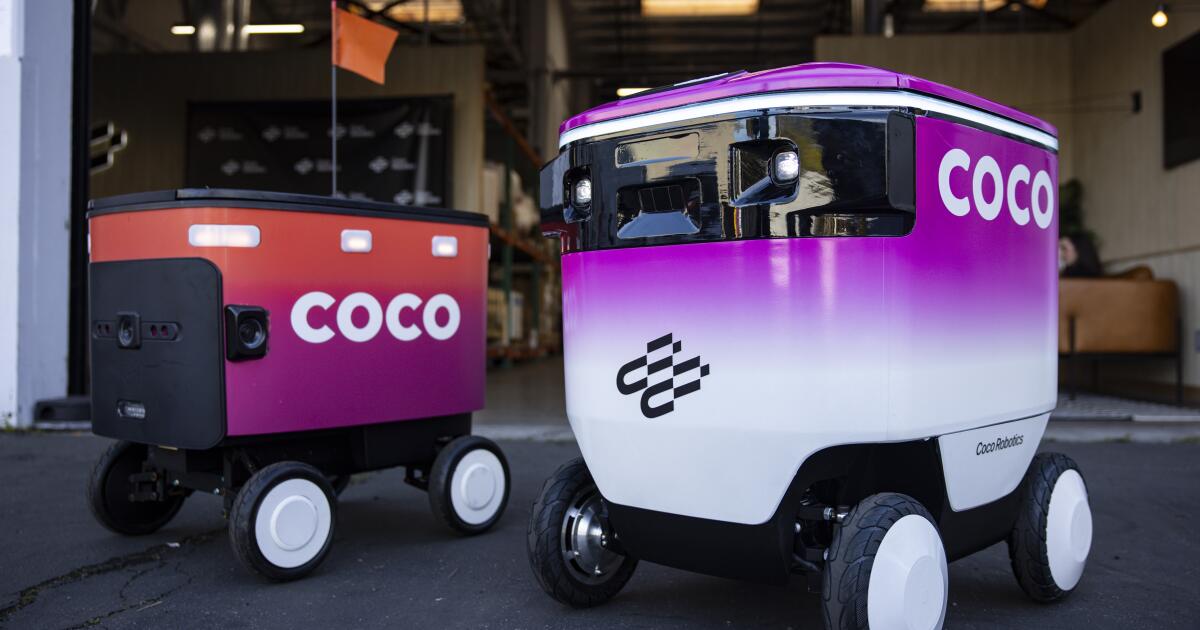California
I was a true L.A. snob. Long Beach forced me to open my eyes
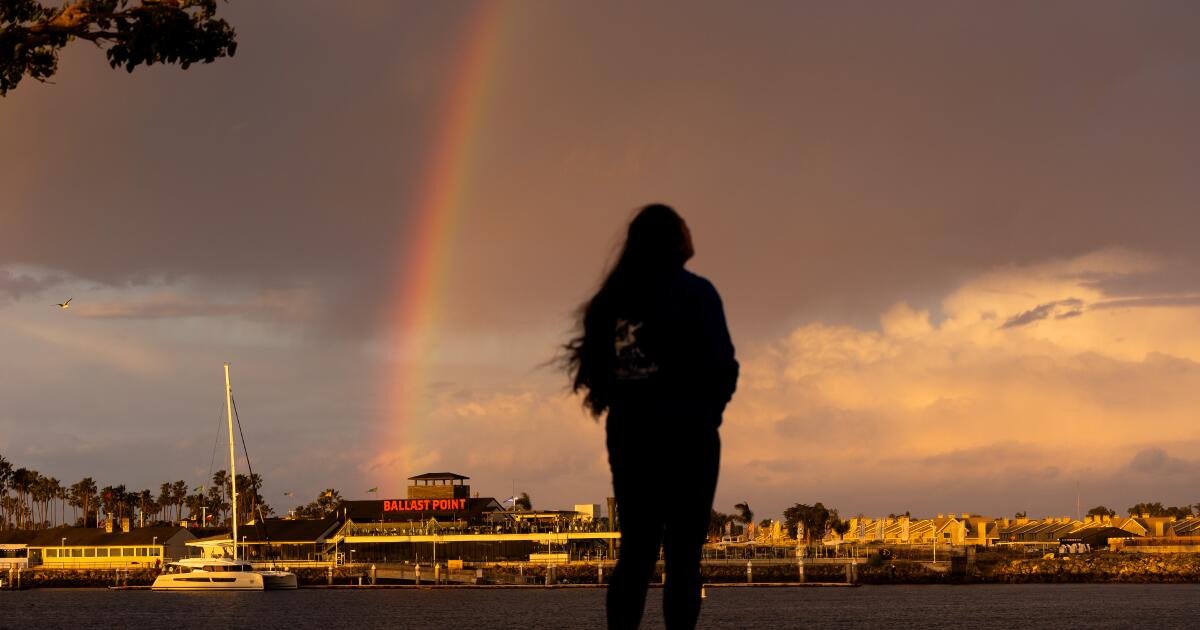
Good morning, and welcome to the Essential California newsletter. It’s Saturday, Aug. 17. Here’s what you need to know to start your weekend:
How Long Beach forced me to leave L.A. snobbery behind
I grew up in the smoggy shadow of Hollywood, which I always felt gave me a bit of unearned cachet.
When the world watched the Oscar afterparties unfold on TV, I just glanced up at the searchlights sweeping the sky in front of L.A.’s most overpriced restaurants and the news choppers circling above the phalanx of limos snaking down Sunset Boulevard. Movie and book backdrops that seemed so exotic to outsiders — “Shampoo,” “Down and Out in Beverly Hills,” “Play It as it Lays,” “Double Indemnity,” “Less Than Zero,” “The Big Sleep” — felt like familiar tours through the old neighborhood.
When I got my first job as a reporter in The Times’ suburban Orange County office, my colleagues offered excited suggestions of things to do in my uber-hip West Hollywood neighborhood. The breakfast place where Quentin Tarantino held court. The industrial Thai eatery inhabited by Johnny Depp. The rooftop pool bar used as an “Entourage” backdrop.
I was too embarrassed to admit my Friday evening plans typically centered on Chinese takeout and a date with Hugh and Barbara on “20/20.”
But it didn’t matter. I felt a bit cooler just because I lived in close proximity to cool people.
Then I moved to the Long Beach area.
Mine was a typical Gen X Southern California migration story: Cheaper housing, shorter commute, “discovering” a place before the hipsters arrived, and in my case, being closer to work friends trying to make it on a journalist’s salary.
At first, I leaned into the Tinseltown snobbery with my L.A. friends. I’ve never seen so many Buicks and Oldsmobiles in my life. Will I ever watch another Wong Kar-wai movie again?
Learning to love Long Beach
Looking out at downtown Long Beach.
(Allen J. Schaben/Los Angeles Times)
But few of them ever ventured down the 710 Freeway to visit. And it did not take long for me to find my place here in ways I never could in West Hollywood. I fell in love with the scrappy charm of a city without airs that was never really ready for its close-up.
The wave-free beach where each view of the ocean must include a cargo ship or an oil well. The rows of vintage bungalows with the chimneys curiously cut off (thanks to the 1933 earthquake). The pickled egg as the city’s favored delicacy and a rickety ocean liner as its top landmark. How one of the most culturally diverse communities anywhere still can’t shake its boring Midwestern roots (Times columnist Jim Murray joked that the city was formed “by a slow leak in Des Moines”). The way there were always people dressed down as much as me
Long Beach is the seventh-largest city in California, and its port some years is the biggest in the country. Yet to the outside world, it never could escape second-banana status compared with the glamorous metropolis to the north. Every few years, there was the article declaring Long Beach the next big thing (“A Gleaming New Long Beach Sheds Its Cornfed Iowa Image.” “Once Moribund Long Beach Is Booming.”). But it never lasts. Long Beach remains Long Beach.
During one of its boom periods in the late 1990s, writer Alan Rifkin got the L.A.-L.B. dynamic just right: “L.A. gets the superiority, Long Beach the deaf ear.” Or put another way, he wrote, Los Angeles feels like a place where “anything can happen,” while Long Beach is a place where it probably won’t happen.
Olympics and ‘Long Beach erasure’
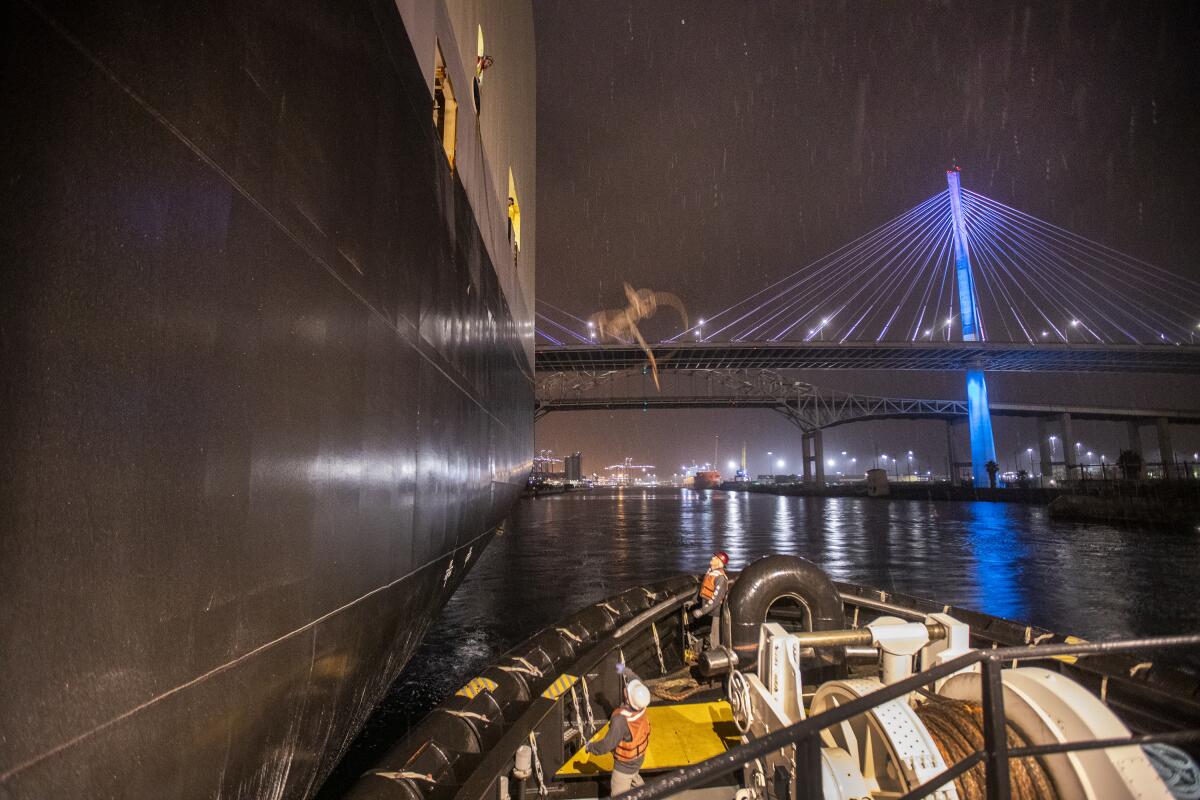
Max Cota and Charlie May reset their lines as the Marjorie C nears its dock in the Port of Long Beach.
(Allen J. Schaben/Los Angeles Times)
And this brings me to the roars of anger that echoed through the city and beyond Sunday afternoon during the closing ceremony of the Paris Olympics.
France handed off the Games to Los Angeles, which will host in 2028. Cut to the beach, where Snoop Dogg and Dr. Dre, the Red Hot Chili Peppers and Billie Eilish performed a mini concert. The spot was widely misidentified as being in Venice … 28 miles and about a million vibes away from the actual location … Long Beach.
Residents were not going to let this slight stand. So they took to social media, correcting the record, sending love to the city and letting loose some long-simmering grievances.
“This is Long Beach erasure,” one loyalist fumed.
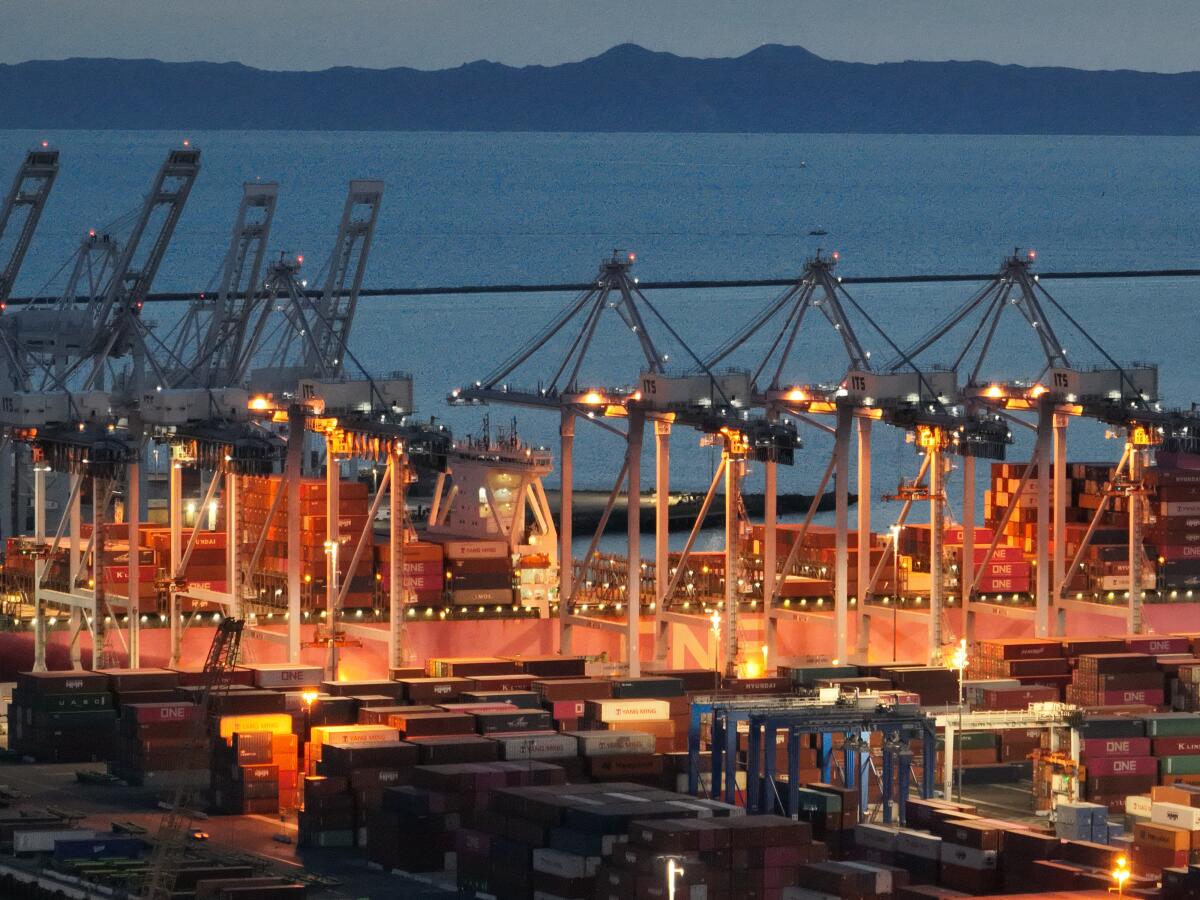
An aerial view of the Port of Long Beach at dusk.
(Allen J. Schaben/Los Angeles Times)
I watched clips of the concert on my phone and felt my own civic pride. I grew up in one of the most filmed places on the planet. But this felt different. This is my chosen home. That beach is where I took my first beach ride after buying my electric bike early in the pandemic and feeling for the first time like things were going to be OK. It was not far from where I perfected my spare rib recipe during a beach barbecue for a friend’s birthday, beginning my love of grilling.
It’s where I stepped out of L.A.’s shadow and became my own person.
And it’s where I had this epiphany: There is much more to life than watching Johnny Depp sample overpriced Pad Thai or eating pancakes a few booths away from Quentin Tarantino.
The week’s biggest stories

(Myung J. Chun/Los Angeles Times)
The state Legislature has been busy
Arrests were made in connection to Matthew Perry’s overdose death
Monday’s earthquake was a reminder of California’s vulnerabilities
There’s interesting new polling on Californian voters
More big stories
Get unlimited access to the Los Angeles Times. Subscribe here.
Column One
Column One is The Times’ home for narrative and longform journalism. Here’s a great piece from this week:
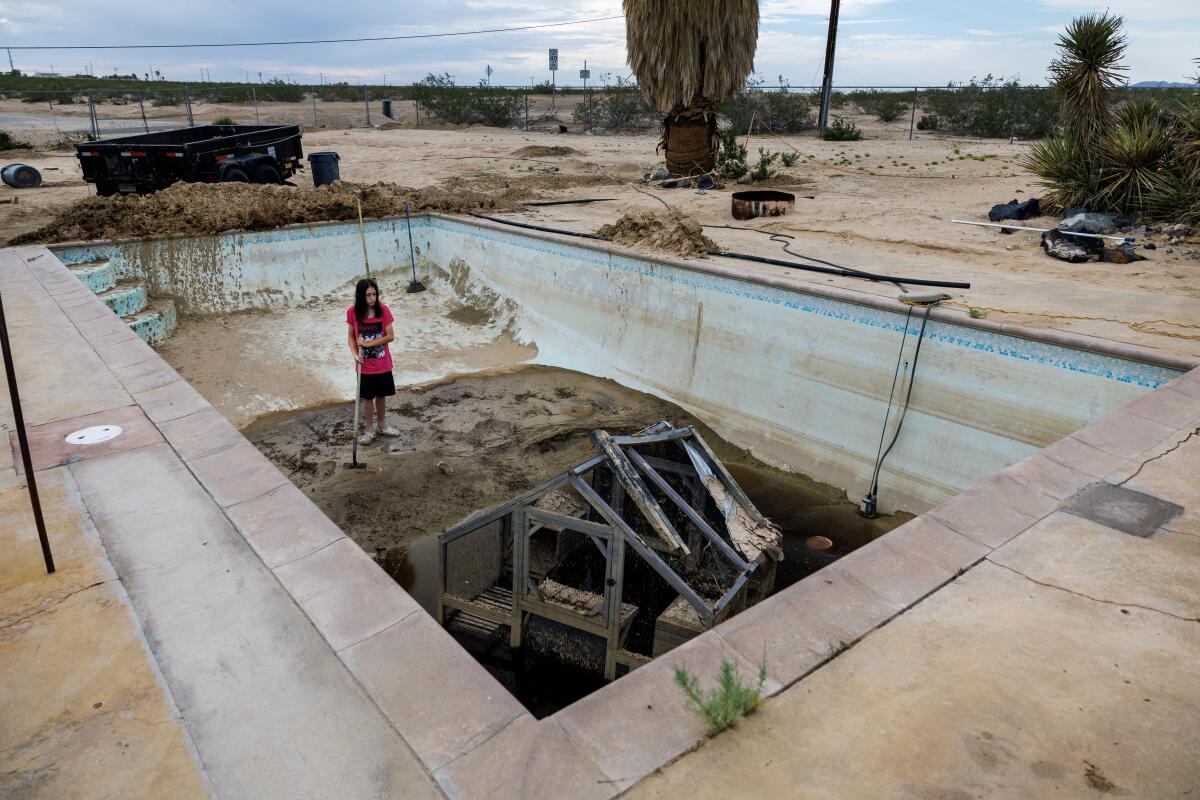
(Gina Ferazzi/Los Angeles Times)
Fast, wet and furious: How the North American monsoon floods the California desert. The North American monsoon plays an important role in the climate of the Four Corners states, bringing crucial moisture to areas that would otherwise be dry.
More great reads
How can we make this newsletter more useful? Send comments to essentialcalifornia@latimes.com.
For your weekend

Wendy (Shelley Duvall) watches television in the Overlook Lobby in Stanley Kubrick’s “The Shining.”
(Lee Unkrich/Warner Bros. Pictures)
Going out
Staying in
How well did you follow the news this week? Take our quiz.

(Times staff and wire photos)
At the recently wrapped Paris Olympics, the U.S. tied with which other country for the most gold medals at 40 each? Plus nine other questions from our weekly news quiz.
Have a great weekend, from the Essential California team
Shelby Grad, deputy managing editor
Karim Doumar, head of newsletters
Check our top stories, topics and the latest articles on latimes.com.

California
‘Trump’s not enough. And he knows he’s not enough’: California governor Gavin Newsom on populism, ‘purity tests’ and whether he’ll run for the presidency

When you think of the politician Donald Trump isn’t, when you think of the norm he broke, the archetype he shattered, you might well picture a man who looks a lot like Gavin Newsom. Tall and handsome, hair coiffed just so, with a blond wife and four photogenic kids at his side, Newsom, who has been the governor of California since 2019 and is often described as the frontrunner to be the Democratic nominee for the White House in 2028, looks the way professional politicians, and especially presidential candidates, look in the movies.
It’s dogged Newsom for years, that look of his, perennially suggesting that he is, in the words of one California newspaper, “too ambitious, too slickly handsome, and too patrician-seeming”, especially for a populist age that cherishes the authentic and has no truck with anything either phoney or “elite”. The elite tag especially has hung around Newsom’s neck for decades, thanks to the fact that his ascent to the top of California politics has seemed smooth and unbroken, apparently eased by a childhood spent in the orbit of the Getty family, when that name was a byword for astronomical wealth.
Now Newsom is bent on busting those myths, laying out in a new memoir a reality that confounds the public image. Sceptics will of course assume that this is just another classic politician move: the book that precedes a campaign for national office. Even so, few readers of Young Man in a Hurry will come away thinking of its author as the “Prince Gavin” of his rivals’ caricature. Instead they will see a man, now 58, whose story is far more complex, and interesting, than the haircut and smile would have you believe – one whose life might just have equipped him to win the most powerful office in the world.
When we speak, in a conversation that will range from a devastating family history to his knack for a stunt – handing out kneepads at Davos to those politicians and corporate titans he accuses of abasing themselves before Trump – he makes his interest in the US presidency clearer than ever, even if he doesn’t quite say outright that he’s running. If there was so much as a scintilla of doubt about his intentions before we talk, not a trace of it is left afterwards. What’s more, Gavin Newsom leaves some valuable clues pointing not only to how he would seek the presidency of the United States – but why.
Via a videocall from his office in Sacramento – the same office, he points out, where “Governor Reagan, not president yet, Ronald Reagan used to reside” – he tells me that the new book “wasn’t done cynically”, that it “wasn’t done intentionally” as a political ploy; that, in fact, it came out of a rejection. In his telling, he had submitted a more conventional politician’s memoir – detailing his handling of California’s wildfires, the pandemic and “Trump 1.0” – with just one chapter on his own upbringing. The publisher read that chapter and said, “Hold on. I didn’t know anything about this.” What she had read ran so “completely counter” to what she had previously thought – the Newsom born with a presumed silver spoon in his mouth – that she demanded more.
This is what she had learned from those pages. That, yes, Newsom’s father had served as consigliere to Gordon Getty, whom he had known since high school and, in that capacity, became exceptionally close to the family, to the point where he and his two children, Gavin and sister Hilary, would feel at home at the Getty mansion on San Francisco’s Gold Coast, and would frequently accompany the clan on outrageously lavish trips abroad. Newsom describes it all: the teenage trips on “the Jetty”, the Gettys’ private plane; being kitted out by a tailor with the clothes he would need to be a house guest of the king of Spain; that time in Venice when he arrived by gondola at yet another party in a 16th-century palazzo, only to be greeted by the debauched face of Jack Nicholson. “Well, well,” said the actor, “if it isn’t the Getty boys.” The young Newsom didn’t correct him.
But, the governor now tells me, “To work for them doesn’t make you them.” For all his decades in the Gettys’ service, William Newsom “never made much money”. He was paid a salary, but it was not enormous. “It wasn’t a financial relationship … it opened up the door of privilege and opportunity, but not wealth. My father passed with nothing.”
That, though, is not the half of it. After Newsom’s parents divorced when he was three, he was raised by his mother. She worked three jobs at once, one of them as a waitress, and took in lodgers and foster children for extra cash. Gavin and his sister were latchkey kids who shared a bedroom. “We were home alone for too many hours on too many days,” he writes. “We raised ourselves on giant bowls of mac and cheese and thought nothing of it.”
The timber of his family tree is riddled with alcoholism and depression. His mother chugged wine from a jug, while her own father was so badly damaged by his experience as a prisoner of war, held by the Japanese, that he once pulled a gun on his three children, telling them very calmly, “I am going to shoot all of you right now.” He eventually took his own life.
It can be hard to square all this with the Newsom persona California voters have known for so long. He was still in his 20s when appointed to his first citywide role in San Francisco by legendary mayor Willie Brown, whom Newsom succeeded in 2004. That year, Harper’s Bazaar ran a feature on “the new Kennedys”, which included a photo of Newsom in a tuxedo, lying on a rug alongside his then wife, TV host Kimberly Guilfoyle, also in evening wear, in the Getty mansion. The marriage would break up, Guilfoyle would go on to date Donald Trump Jr, and she is now the US ambassador to Greece, while Newsom would marry Jennifer Siebel, an actor and documentary film-maker from a Republican family. But the image lingered.
For some, the disconnect between that and the upbringing Newsom describes in his book is just too much. One former associate described it to the New Yorker as Newsom’s “I was born a poor Black child” story – a reference to the spoof opening monologue of Steve Martin’s 1979 comedy The Jerk. But Newsom is emphatic that “the press’s one‑dimensional portrait of me” is wrong, that he really did live in a “duality”, moving between two worlds: one of scarcity and struggle; the other of fabulous opulence – and that, if his memoir reads like a strange mashup of The Great Gatsby and Hillbilly Elegy, that’s just how it was.
Even those reluctant to concede Newsom his hardscrabble roots have to allow that he did face one obstacle that, on its own, puts the lie to the notion of his career as a smooth ride. He has what he calls a “learning disability”, in the form of severe dyslexia. At school, he says, “I couldn’t read, I couldn’t spell, I couldn’t write.” (He is upfront that his memoir is ghostwritten.) He was sure he was stupid – “a gimpy geek with a bowl cut” – and he was regularly bullied. (They’d call him “New‑scum”, the same word hurled at him by Trump.) To this day, he can only read laboriously, underlining almost every word, then copying out the underlined passages to a notepad, and then copying those out on index cards, which he keeps in a voluminous filing system. He cannot read from an Autocue, at least not in a way most people would recognise as reading.
“We would never be having this conversation if it wasn’t for the gift of dyslexia,” he tells me. It didn’t feel like a gift at the time, but now he can see the effect it’s had. He is a “politician that doesn’t read speeches. You’ve never seen me read a written text in a speech. I don’t look up and down. I’m off script all the time.” In the age of populism, that’s a boast. Given that authenticity is probably the single most prized quality in politics, and that the opposite of authentic is scripted, Newsom is happy to tell you he is literally incapable of being scripted.
It’s had other effects, too. He can’t easily read words, so, “as a consequence, you have to make up for that. You have to read the room. You have to have some emotional intelligence. You feel things.” Besides, having to stand before audiences without the crutch of a text inevitably brings “anxiety and insecurity. And you try to make up for that. And the only way you can make up for that is hard work and grit. And you got to practise. So there’s this notion of reps and resiliency.”
No one disputes Newsom’s work ethic. As he puts it, “You’re just not going to outwork me. I mean, you may think you’re going to outwork me, but you’re not. I’m going to read 10 times more. It may take me 10 times longer to read … [but] I’m going to have to come prepared because, you know, I can’t fake it. I can’t dial it in, and I can’t dial up someone else’s words that are put on a piece of paper, like so many others in my racket, in politics. And so I’m going to spend 10 hours for 10 minutes.”
The tuxedo photoshoot made him look like a playboy – and his dating life as a divorcee mayor in the 2000s kept the San Francisco gossip columnists busily happy – but he is in fact a swot: studying ahead of every meeting, ploughing through papers on his 90-minute commute, underlining and writing out lines. That’s what he means by reps. For him, taking in information is like lifting weights: it requires repetition.
The result is a wonkishness that, again, hardly fits the show pony image. When he appeared as a guest on New York Times journalist Ezra Klein’s podcast, the two went several rounds on modular construction and the role of off-site manufacture in addressing the housing crisis. Newsom is a politician who feeds on a policy-rich diet.
That habit was shaped thanks to a brief but formative part of his career, one that sets him apart from his likely rivals for the 2028 Democratic nomination. Straight out of college, which he had reached only because he had made himself – through hours and hours of practice – a decent baseball player, a left-arm pitcher, Newsom founded a business. A wine store called PlumpJack, in homage to Falstaff, which he set up in San Francisco and where he put his hands-on work ethic to intense use. (In the book, Newsom is at pains to make clear that though Gordon Getty was an early investor, he was one of seven or eight, each giving a modest $15,000.)
PlumpJack proved a great success. It would eventually become an operation with four wineries, two boutique hotels, seven restaurants and bars, two clothes shops and 700 employees – among them, until her death at age 55 via an assisted suicide, which Newsom concedes was then illegal under California law, Newsom’s mother. Its co-presidents are Newsom’s sister Hilary and their cousin.
Newsom says it was building that business that made him a magpie for the ideas of others, agnostic as to their origin, interested solely in what brought success. “Part of being an entrepreneur,” he tells me, “is always casing other people’s joints, constantly figuring out where your competition is going, what they’re about to do, what are the trend lines … I took that and applied it to politics.”
He’s making a point about policy and the search for best practice, but the political application goes wider than that. For one thing, if Newsom is the nominee in 2028, Republicans will struggle to run what has long been one of their favourite lines against Democratic opponents: that they have never run a business, never created a job, that all they’ve known is politics. His business record is one more way in which Newsom might be able to appeal to red state voters as well as blue state ones. Yes, he is the governor of one of the most liberal states in the union, having been mayor of one of the most liberal cities in the country, the mere words “San Francisco” usually enough to whip up a rightwing crowd. But, as the veteran Democratic strategist James Carville told the New Yorker, Newsom can get around that: “Part of his selling will have to be, I can play in the middle of the country – I can play freshwater and I can play saltwater.”
The family he has today will help. Like so much else about him, it’s a duality. At first glance, it could have been designed to delight a Fox audience: the slim, blond wife alongside four kids, aged 10 to 16 – two daughters, Montana and Brooklynn, and two sons, Hunter and Dutch. But the blue state crowd will warm to the fact that Siebel has chosen to be known as the first partner of California, rather than first lady; that her documentaries interrogate themes that include the under-representation of women in positions of power and American notions of masculinity. (Newsom’s book describes the day Siebel told him about her experience at the hands of Harvey Weinstein: in 2022 she testified in court that, 17 years earlier, Weinstein had raped her in a hotel room.)
Newsom’s record is itself a duality. At one point, he tells me, “You’re talking to one of the most progressive politicians in the United States.” As if addressing the Democratic core voters who will choose a 2028 standard bearer in primaries, he rattles off the evidence, starting with the act that first made him a national figure, when just weeks after becoming mayor in 2004, he authorised the first same-sex marriages in US history, prompting thousands of lesbian and gay couples from across the country to head to City Hall in what became known as the “winter of love”. (John Kerry, his party’s presidential nominee that year, was said to have blamed Newsom’s move for his defeat, by galvanising conservatives and evangelical Christians to vote against him.)
But Newsom is just clearing his throat. He ticks off his tally of progressive achievements. “We have universal healthcare in California, regardless of immigration status and regardless of pre-existing conditions or ability to pay. We have the highest minimum wage in the United States of America for healthcare workers: $25. Fast-food workers: $20. $16.90 for everybody else.” He talks about the threat that extreme inequality between rich and poor now poses to the republic; one of his lines is, “We’ve got to democratise our economy to save our democracy.” He says that on so many issues that the New York mayor and progressive pin-up Zohran Mamdani and the left argue for, California has already forged ahead. “We’re being very aggressive calling out Trump and Trumpism, putting a mirror up to this president and punching him back in ways that are very aggressive, not just stylistically.”
He’s referring to Proposition 50, the statewide referendum Newsom pushed last November, urging Californians to agree to a redistricting plan that would give Democrats five more seats in the House of Representatives – to offset the five-seat advantage Republicans had given themselves by redrawing congressional boundaries in Texas. It was a huge gamble. Voters don’t always turn out for what can look like technical, procedural measures, and had Prop 50 lost, Newsom would have been tainted by failure, his electoral pull exposed as weak. Instead, it passed by a walloping 29 points. Overnight, Newsom had established himself as a – if not the – leader of the opposition, a Democrat not looking to split the difference but ready to take the fight to Trump and the Republicans.
And yet, that record sits alongside a résumé as a moderate Democrat, one that goes back just as long. Serving on the equivalent of San Francisco’s city council, in 2002 he antagonised the left with a scheme called Care Not Cash, which slashed payments to homeless people, using the money to fund housing and help with drug addiction and mental illness. He says it worked.
More recently, Newsom has angered the left again. Last year he launched a podcast, This Is Gavin Newsom. He knows it’s a cliche: “You roll your eyes. God, a politician, an American politician, with a podcast and a book.” But that’s not what riled many on his own side. It was his choice of guests. He has featured Steve Bannon and Maga-before-Maga talkshow host Michael Savage, whose longtime mantra was “borders, language, culture”. On his debut show, Newsom interviewed Charlie Kirk.
Naturally, Newsom was denounced for platforming – he puts the word in quotes – hate figures from the right. What’s more, on that first episode, Newsom mused that transgender athletes’ participation in professional women’s sports was “deeply unfair”. The backlash was immediate. Many detected a political calculation, Newsom signalling that he understood the much‑discussed vibe shift revealed by the defeat of Kamala Harris a few months earlier and pointedly breaking from the activist left of his party.
The governor insists it was nothing of the sort. His view was shaped, he says, by practical experience. Two years earlier, “we had some statewide championships in track and field, where there was a trans athlete that was successful in [defeating] another athlete. And there was tremendous controversy. We tried to accommodate for that and address the issue of fairness and some advantages that I think, by any objective standards, existed and persisted. And the difficulty was we couldn’t figure it out.” A year later, the issue recurred and, again, Newsom could not see a fair solution. “And so Charlie Kirk asked me a direct question, and I answered it.”
He says he’s sorry that he hurt the feelings of some on his own side, but he thinks the response he got teaches its own lesson. “Frankly, we were becoming a little too judgmental as a party … this idea that somehow you’re countenancing a point of view or perspective by engaging in conversations, that somehow you’re complicit … There was a purity test” – according to which nothing less than total orthodoxy on key issues is good enough. “I have a difference of opinion with my party on sports for transgender athletes. And there was tremendous judgment and condemnation for that point of view, somehow saying I’ve abandoned the LGBTQ community. I’ve walked away. I’m throwing them under the bus. I think it’s that kind of tonality that pulls people away.”
Newsom says he’s interested in finding those areas where Democrats and Republicans might come together. Just as likely, he wants to see where Democrats might win over former Republicans and gain their votes. He’s back to casing the competing joints, looking for the clues that Republican success in 2024 left behind. He consumes rightwing media, watching more Fox News than he ever watched MSNBC, now rebranded as MS NOW, and is particularly keen to work out how the right cuts through among young men. That’s a trick Democrats need to match.
Still, it’s a duality: Newsom simultaneously the most pugnacious Democrat on the playing field – trolling the president with Trump-style social media posts, complete with capital letters and multiple exclamation marks – and the advocate of building bridges that might connect blue and red America. That connection has to happen, he says, because “divorce is not an option”.
Can you be both at once: attack dog and unifier? Newsom thinks so. When I offer a range of apparently competing strategies for opposing Trump, some on the offensive, some aimed at accommodation, asking which he prefers, he answers, “All of them.” He sees no reason to choose.
“I mean, you can stand your ground, be firm, but also have an open hand, not a closed fist in terms of dealing with our common humanity. This notion that it’s got to be one or the other, that’s the tyranny of ‘or’ versus the genius of ‘and’ … I think there’s nuances in life. It’s not black and white. It’s not binary. I think that’s the way we need to approach life.”
He extends that – sort of – even to Trump himself. In the book, he describes an encounter during Trump’s first term, where the governor and the president rode on Air Force One together. The Trump that Newsom saw seemed eager, in private, to win him over, to josh with him, to be liked by him. He looked needy. Is Newsom saying he almost felt sorry for Donald Trump?
“He wants to be loved. He needs to be loved. Yes, he’s a narcissist. He’s desperate for it. He doesn’t care if he’s the heel or the hero, as long as he’s the star … He’s broken in many ways. That’s why he tried to break this country on January 6 … and why he will do more to destroy this republic, today, tomorrow and into the future. It’s a tragic story, but it’s a very human story.
“You know, I think it’s why he desperately needed to become president of the United States again. It’s why he’s trying to rename everything in his image. It’s never enough, because he’s not enough and he knows he’s not enough. And I think the remarkable thing is how easy it is to play on that. How easily our foreign adversaries are able to manipulate him.”
It’s one thing to play him, Newsom says, “but you also have to stand up to him. You’ve got to fight him, you’ve got to fight the bully. I felt like the [Mark] Carney [at Davos] speech represented that … [Emmanuel] Macron began to sort of lean into that. There’s a new tone and tenor.” He wants to see the post-1945 transatlantic alliance survive, he says, and that requires strength in the face of Trump. At Davos, he urged European leaders to realise that “grovelling to Trump’s needs” makes them “look pathetic on the world stage”.
We’ve talked for a while and the subject can be avoided no longer: is Gavin Newsom going to run for president? I remind him that he once said that it’s “better to be candid than be coy”. He laughs, adding, “I shouldn’t have said that” – and so I urge him to be candid now. An easy question first. He doesn’t have to tell me what he’s decided, but has he made up his mind about running?
“Absolutely, I have not.” He says he cannot know now what the moment will require in 2028. But he’s clear that, if he runs, he won’t be doing it to fill a psychic hole, like Trump. It won’t be to make up for a lack of parental love. For all her challenges, his mother “did give me a lot of hugs. And I was loved by my dad, despite the fact he could never say it.” If he does it, it will be because he thinks he can be “a solution to a problem”. He says that for a guy like him, who got a low SAT score of 960 – he urges me to look that up, to see how bad it is – even to be asked such a question is humbling. “And so I’m not going to say no, because I’d be lying by saying that, but I absolutely cannot say yes.”
I push him a bit more. What if the threat to democracy is as sharp in 2028 as he believes it is now?
He says “something shifted in me” at two points in 2025. One was in January, just ahead of Trump’s second term, when, as Newsom saw it, Trump tried to “weaponise” the California wildfires, seeking to extract political advantage from an opponent and a hostile blue state in distress. The second came in the summer, when Trump deployed the National Guard in Los Angeles, along with 700 active duty marines. They “were not sent overseas but were sent to the second largest city in the United States”.
That January, “I was experiencing something I was not prepared for. A president-elect trying to take down an American city, trying to take down an American politician in a way that I, frankly, was not prepared for. Six months later, with the National Guard, I just started to shift tonally, my temperament, my approach.”
He says that he’s on “the other side” of that shift. “There’s a freedom now that I feel. And I’m running around Davos with kneepads, taking shots at folks that I used to admire and respect that I feel have sold their souls. And this is an existential moment that goes to your question. If someone else doesn’t have that fire, that sense of purpose and mission, then, yeah, I could see myself stepping into that void.”
It’s not an announcement, but it’s not far off it. It comes from a man who has never lost an election and who always comes prepared. And he’s preparing right now.
California
‘Not a done deal’: California vows ‘vigorous’ review of Paramount-Warner Bros takeover

Rob Bonta, California’s attorney general, said his office will investigate a possible merger between Paramount Skydance and Warner Bros Discovery, hours after Netflix backed away from a planned takeover.
“Paramount/Warner Bros is not a done deal,” Bonta said in a post on X. “These two Hollywood titans have not cleared regulatory scrutiny — the California Department of Justice has an open investigation, and we intend to be vigorous in our review.”
Any acquisition of Warner Bros would require approval from regulators in the United States and Europe, including the US justice department’s antitrust division. The deal Paramount struck for Warner is valued at nearly $111bn.
The merger poses a risk for California’s economy. Paramount’s bid is likely to raise concerns about job cuts in the state, which also dogged Netflix’s bid. Paramount sees $6bn in cost “synergies” in the deal, which typically means massive layoffs, reducing the number of suppliers, squeezing existing contractors for better terms after the two companies merge or other reductions.
The chief executive of Paramount, David Ellison, said his company was pleased the Warner Bros board had “unanimously affirmed the superior value of our offer”, which he said delivered “WBD shareholders superior value, certainty and speed to closing”. Ellison is the son of Oracle co-founder Larry Ellison, a close ally of Donald Trump.
On Friday, Warner Bros Discovery reportedly agreed to be acquired by Paramount Skydance. Reuters and Deadline reported that the deal was announced in a global town hall by the company. Paramount and Warner Bros did not immediately confirm the deal to the Guardian.
A merger between the two media giants is also facing backlash from several lawmakers. Senator Elizabeth Warren, a key voice against growing monopolies, echoed Bonta’s concerns after Netflix walked away from the deal on Thursday, and noted that Netflix CEO Ted Sarandos was seen at the White House shortly before the company said it would bow out of the deal.
“A Paramount Skydance-Warner Bros merger is an antitrust disaster threatening higher prices and fewer choices for American families,” Warren said in a statement. “What did Trump officials tell the Netflix CEO today at the White House? A handful of Trump-aligned billionaires are trying to seize control of what you watch and charge you whatever price they want.”
The senator added: “With the cloud of corruption looming over Trump’s Department of Justice, it’ll be up to the American people to speak up and state attorneys general to enforce the law.”
On Friday, Bonta responded to concerns about the merger posted by actor Mark Ruffalo.
“Please let’s circle up all the State AG’s and talk about how this is going to kill completion in the industry and drive down wages, and product quality for consumers,” Ruffalo posted.
“There are lots of agents in Hollywood who can tell you how past mergers and consolidations have hurt their clients and business. There is lots of talent that can tell you the same.”
Bonta reposted the actor’s comments, responding that he is in “conversation with my AG colleagues about Paramount/Warner Bros”.
The California department of justice did not immediately respond to a request for comment from the Guardian.
The Writers Guild of America, the union representing thousands of television and film writers along with other media workers, has said a Paramount takeover of Warner Bros would hurt jobs.
Warner Bros canceled $2bn in content after merging with Discovery in 2022, and Paramount’s recent merger with Skydance led to 1,000 layoffs, the union said in written testimony to the US Senate.
California
Amid angry backlash, serial child molester is rearrested the same day he was set to be paroled

Following major backlash about the scheduled release of a serial child molester through California’s elderly parole program, the 64-year-old is now facing new charges that could keep him behind bars.
News that David Allen Funston was set to be freed was met by outrage among victims, politicians and others. The former Sacramento County district attorney who prosecuted Funston said she was strongly opposed to his release: “This is one I’m screaming about.”
Funston, granted parole earlier this month, was set to be released on Thursday from state prison — but was rearrested that same day on new charges from a decades-old, untried case. The charges he’s facing are from a 1996 case in which he is accused of sexually assaulting a child in Roseville, according to the Placer County district attorney’s office.
In 1999, he was convicted of 16 counts of kidnapping and child molestation and had been serving three consecutive sentences of 25 years to life and one sentence of 20 years and eight months at the California Institution for Men in Chino. The sentences followed a string of cases out of Sacramento County in which prosecutors said Funston lured children under the age of 7 with candy and, in at least one case, a Barbie doll to kidnap and sexually assault them, often under the threat of violence.
He was described by a judge at his sentencing hearing as “the monster parents fear the most.”
Prosecutors in Placer County, at the time, decided not to pursue the case against Funston in Roseville given the severity of the sentences he received in Sacramento County.
But given his scheduled release from state prison, prosecutors decided to file new charges against him. Placer County Dist. Atty. Morgan Gire said “changes in state law and recent parole board failures” led to his improper release.
“This individual was previously sentenced to multiple life terms for extremely heinous crimes,” Gire said in a statement. “When changes in the law put our communities at risk, it is our duty to re-evaluate those cases and act accordingly. David Allen Funston committed very real crimes against a Placer County child, and the statute of limitations allows us to hold him accountable for those crimes.”
He is now being held without bail in the Placer County jail, booked on suspicion of lewd and lascivious acts against a child, according to prosecutors. Funston’s attorney, Maya Emig, said she had only recently learned about his arrest and hadn’t yet had time to fully review the matter.
But she noted that she believes “in the justice system and the rule of law.”
Emig called the Board of Parole Hearings’ decision to grant Funston elderly parole “lawful and just.”
California’s elderly parole program generally considers the release of prisoners who are older than 50 and have been incarcerated for at least 20 continuous years, considering whether someone poses an unreasonable risk to public safety.
In Funston’s case, commissioners said they did not believe Funston posed a significant danger because of the extensive self-help, therapy work and sex offender treatment classes he completed, as well as his detailed plan to avoid repeating his crimes, the remorse he expressed and his track record of good behavior in prison, according to a transcript from the Sept. 24 hearing.
At the hearing, Funston called himself a “selfish coward” for victimizing young children, and said he was “disgusted and ashamed of my behavior and have great remorse for the harm I caused my victims, their families in the community of Sacramento.”
“I’m truly sorry,” he said.
But victims of his crimes, as well as prosecutors and elected leaders have questioned the parole decision and called for its reversal.
“He’s one sick individual,” a victim of Funston’s violence told The Times. “What if he gets out and and tries to find his old victims and wants to kill us?”
A spokesperson for Gov. Gavin Newsom said the governor also did not agree with Funston’s release and had asked the board to review the case. However, Newsom has no authority to overturn the parole decision.
Some state lawmakers also cited Funston’s case as evidence that California’s elderly parole program needs reform, recently introducing a bill that would exclude people convicted of sexual crimes from being considered by the process.
-

 World2 days ago
World2 days agoExclusive: DeepSeek withholds latest AI model from US chipmakers including Nvidia, sources say
-

 Massachusetts3 days ago
Massachusetts3 days agoMother and daughter injured in Taunton house explosion
-

 Montana1 week ago
Montana1 week ago2026 MHSA Montana Wrestling State Championship Brackets And Results – FloWrestling
-

 Louisiana5 days ago
Louisiana5 days agoWildfire near Gum Swamp Road in Livingston Parish now under control; more than 200 acres burned
-

 Denver, CO3 days ago
Denver, CO3 days ago10 acres charred, 5 injured in Thornton grass fire, evacuation orders lifted
-

 Technology1 week ago
Technology1 week agoYouTube TV billing scam emails are hitting inboxes
-

 Technology1 week ago
Technology1 week agoStellantis is in a crisis of its own making
-

 Politics1 week ago
Politics1 week agoOpenAI didn’t contact police despite employees flagging mass shooter’s concerning chatbot interactions: REPORT








